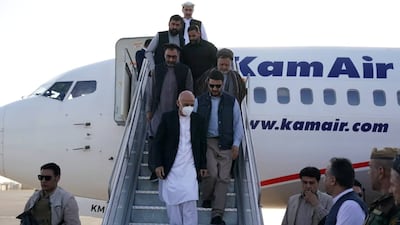Afghan President Ashraf Ghani flew to the besieged northern city of Mazar-i-Sharif on Wednesday to rally his beleaguered forces, with Taliban fighters having taken more than a quarter of the country's provincial capitals in less than a week.
The Taliban captured Faizabad overnight, making it the ninth city to be overrun since Friday.
Mr Ghani held talks with Mazar's strongman Atta Mohammad Noor and warlord Abdul Rashid Dostum about the defence of the city, as Taliban fighters inched closer to its outskirts.

The loss of Mazar-i-Sharif would be a catastrophic blow to the Kabul government and would represent the complete collapse of its control over the north, which has been a long-time bastion of anti-Taliban militias.
"We are probably experiencing the most massive, brutal and opportunistic military campaign of violence and terror by the Taliban ever in the history of our country," said Afghan Foreign Minister Mohammad Haneef Atmar on Wednesday at an event hosted by the Australian Strategic Policy Institute.
After conquering most of the north, the Taliban have now set their sights on the region's biggest city, Mazar-i-Sharif, long a linchpin for the government's control of the area, after capturing Sheberghan to the west, and Kunduz and Taloqan to the east.
Hours before Mr Ghani arrived, pictures on official government social media accounts showed Mr Dostum boarding a plane in Kabul en route to Mazar, along with a contingent of commandos.
Fighting in Afghanistan's long-running conflict has escalated dramatically since May, when the US-led military coalition began the final stages of a withdrawal expected to be completed before the end of the month.
Farther to the east of Mazar, in Badakhshan's capital Faizabad, a local politician told AFP that security forces had retreated after days of heavy clashes.
“The Taliban have captured the city now,” said Zabihullah Attiq, confirming the latest city to fall.
Government forces were also battling the insurgents in Kandahar and Helmand, the southern Pashto-speaking provinces from where the Taliban draw their strength.
In Kandahar, fierce clashes erupted between the insurgents and security forces, with heavy fighting being reported near the city's prison, which the militants have been trying to reach for weeks.
The Taliban frequently launch assaults on prisons to release fighters and replenish their ranks.
Mr Atmar admitted that at times "we are not so proud of" the performance of the Afghan national security forces. He said the loss of air support "led to the diminishing capabilities of our forces to put up a resistance".
"I understand that the [international] forces are withdrawn, but a continuation of the partnership is essential" to avoiding a worsening humanitarian crisis, said Mr Atmar.
At least 18 million Afghans are facing hunger because of the recent wave of violence, he said.
"We expect more from our regional and international partners," he said.
But even as the Taliban routed government forces, US President Joe Biden suggested he would not delay the withdrawal of all American troops, who are scheduled to leave by August 31.
On Tuesday he urged Afghan leaders to “fight for themselves”.
“I do not regret my decision” to withdraw US troops after two decades of war, he said in Washington.
And as fighting raged, US diplomats were desperately trying to breathe life back into stalled talks between the Afghan government and the Taliban in Doha, where Washington's special envoy Zalmay Khalilzad was pushing the insurgents to accept a ceasefire.
Mr Atmar said Afghanistan would continue working with partners on the Doha ceasefire, but said he remained sceptical of the process.
Afghanistan was encouraged by its allies to negotiate with the Taliban, but "we were all deceived", he said.
"The Taliban, who are deceptive, did not honour their obligations as part of the Doha peace agreement," he said.
Mr Biden emphasised that Washington would continue to support the Afghan security forces with air strikes, food, equipment and money for salaries.
“They have got to want to fight. They have outnumbered the Taliban,” he said.
The Taliban have appeared largely indifferent to peace overtures, and seem intent on a military victory to crown a return to power after they were ousted 20 years ago after 9/11.
The insurgents appeared to be consolidating their hold over captured cities in the north, with rifle-toting militants patrolling the streets of Kunduz on foot and in armoured vehicles as smoke rose from smouldering shops destroyed during the fight for the city.
Mazar endured some of the bloodiest fighting during the Taliban's scorched-earth rampage through the country in the 1990s, with rights groups accusing the group of massacring up to 2,000 civilians, mostly Shiite Hazaras, after capturing the city in 1998.

